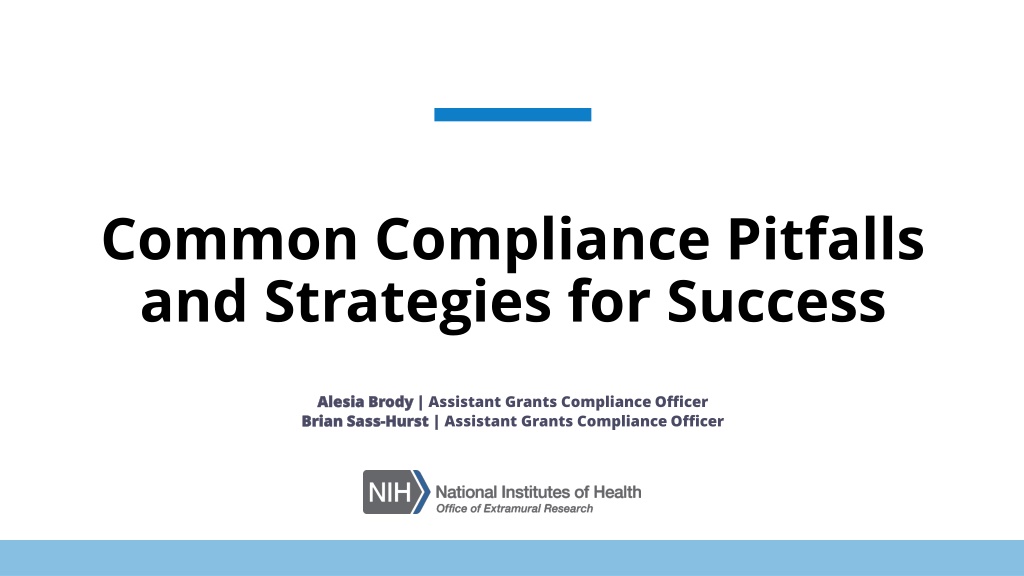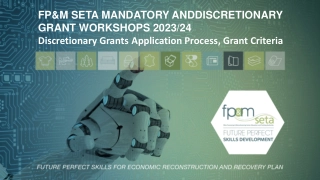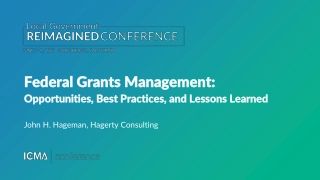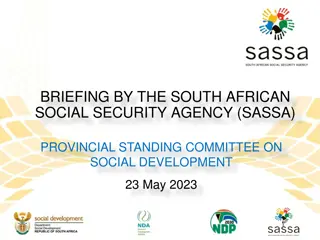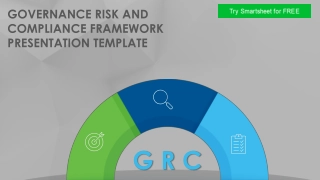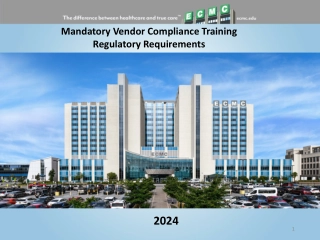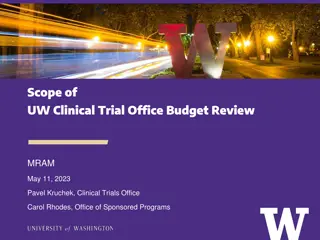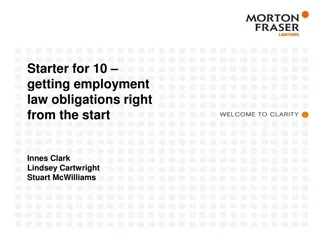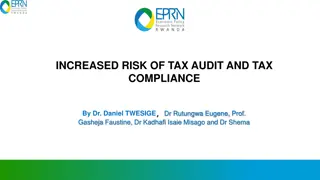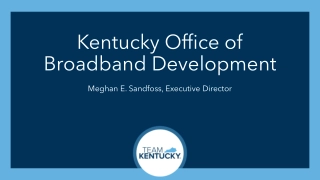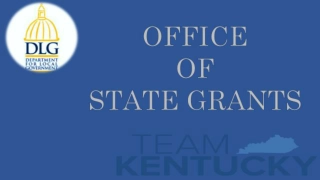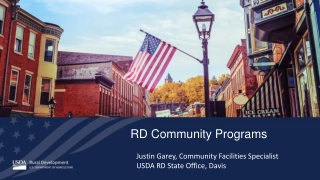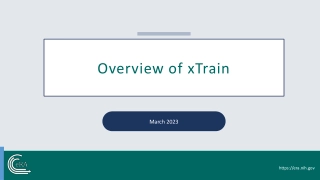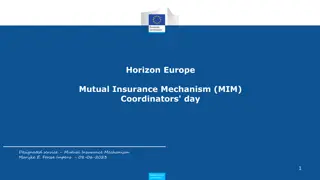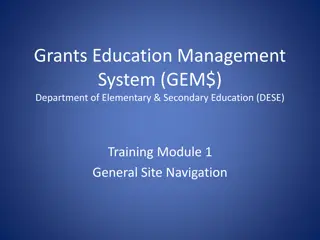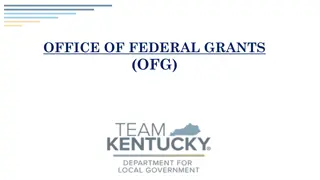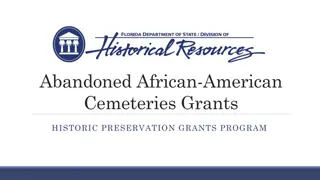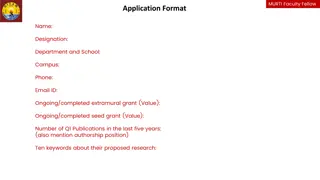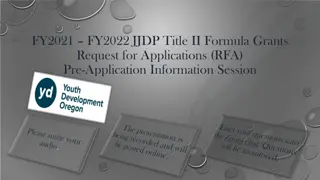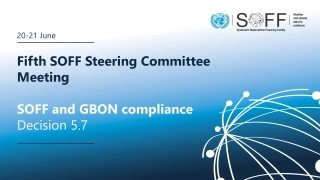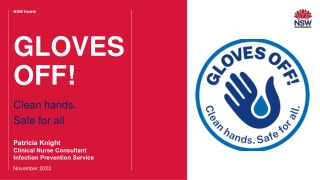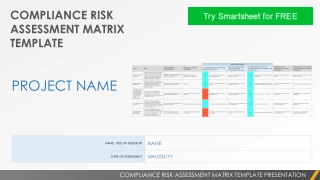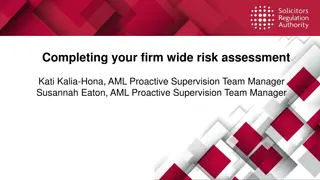Effective Strategies for Grants Compliance Success
Effective grants compliance involves managing public funds efficiently to maximize research outcomes while avoiding fraud and mismanagement. Recipients have responsibilities like safeguarding assets, proper fund stewardship, and adhering to award terms. Compliance requirements include institutional policies, organizational structures, and ethical considerations. Regulations such as OMB's 2 CFR Part 200 outline administrative, cost principles, and audit requirements for federal awards.
Download Presentation
Please find below an Image/Link to download the presentation.
The content on the website is provided AS IS for your information and personal use only. It may not be sold, licensed, or shared on other websites without obtaining consent from the author. Download presentation by click this link. If you encounter any issues during the download, it is possible that the publisher has removed the file from their server.
- Grants compliance
- Financial management
- Fraud prevention
- Institutional policies
- Regulatory requirements
Presentation Transcript
Common Compliance Pitfalls and Strategies for Success Alesia Brody | Alesia Brody | Assistant Grants Compliance Officer Brian Sass Brian Sass- -Hurst | Hurst | Assistant Grants Compliance Officer
Compliance is The effective management of public funds to maximize research outcomes The avoidance of fraud, institutional mismanagement, and poor management of Federal funds 2
Recipients Responsibilities Safeguarding all assets Spending funds in accordance with the authorized purpose Developing and implementing systems to ensure proper stewardship of funds Financial management systems Procurement systems Payroll Distribution systems Monitoring activities Adherence to terms & conditions of award 3
Compliance Requirements: Institutional Policies Institutional Policies Organizational Structure Purchasing Accounting/Budgetary Controls Payroll Distribution Travel Consulting Property Management Ethics/Conflict of Interest 4
OMB Regulations 2 CFR Part 200 Uniform Administrative Requirements, Cost Principles and Audit Requirements for Federal Awards https://www.ecfr.gov/current/title-2/part-200 5
Administrative Requirements 2 CFR Part 200, Subpart C Pre-Federal Award Requirements and Contents of Federal Awards ( 200.200 - 200.216) 2 CFR Part 200, Subpart D Post Federal Award Requirements ( 200.300- 200.346) 6
Cost Principles 2 CFR Part 200 Subpart E Cost Principles ( 200.400 - 200.476) General Provisions oInstitutions of Higher Education (IHE), State, Local Governments and Indian Tribes, and Non-profit Organizations Appendix VIII Nonprofit organizations exempted from Subpart E Appendix IX oHospitals 7
Audit Requirements 2 CFR Part 200 Subpart F Audit Requirements ( 200.500 200.521 NIH Grants Policy Statement Section 8.4.3: Foreign Organizations must follow the same requirements as For- Profit Organizations 8
Audit Requirements NIH grant recipients that expend $750,000 or more within a year in Federal awards are subject to audit requirements under 2 CFR 200.501, as specified in NIH GPS 8.4.3. For-Profit and Foreign Organization audit requirement: Expend $750,000 under one or more HHS awards (as a direct recipient and/or consortium participant) Audits are due within the earlier of 30 days after receipt of the auditor s report(s) or 9 months after the end of the recipient s audit period. Recipients delinquent in submitting audits risk the imposition of sanctions and potential loss of Federal funds. With prior approval, covered organizations receiving funding under one program may elect a program-specific audit of that program, subject to the provisions of 2 CFR 200.507. 9
Summary of Audit Requirements Recipient Type Recipient Type Source of Audit Requirement Source of Audit Requirement Where to Submit Audit Reports Where to Submit Audit Reports State & Local Governments 2 CFR 200.501 Federal Audit Clearinghouse (See contact information in NIH GPS 20.2) Colleges & Universities (IHEs) 2 CFR 200.501 Federal Audit Clearinghouse (See contact information in NIH GPS 20.2) Non-Profits 2 CFR 200.501 Federal Audit Clearinghouse (See contact information in NIH GPS 20.2) Hospitals 2 CFR 200.501 Federal Audit Clearinghouse (See contact information in NIH GPS 20.2) For-Profits 2 CFR 200.501 Audit Resolution Division (See contact information in NIH GPS 20.2) Foreign Organizations NIH Grants Policy Statement (same as For-Profits) Audit Resolution Division (See contact information in NIH GPS 20.2) 10
Summary of Federal Requirement References Recipient Type Recipient Type Administrative Requirements Administrative Requirements Cost Principles Cost Principles Audit Requirements Audit Requirements State & Local State & Local Governments and Governments and Indian Tribes Indian Tribes Institutions of Higher Institutions of Higher Education Education 2 CFR Part 200, Subpart E 2 CFR Part 200, Subpart F 200.500-200.521 2 CFR Part 200, Subpart C Pre- Federal Award Requirements and Contents of Federal Awards 200.200- 200.216 2 CFR Part 200, Subpart E Also applicable to non- profit Hospitals 2 CFR Part 200, Subpart E Appendix VIII exempted from Subpart E Non Non- -Profits Profits AND 2 CFR Part 200.500- 200.521 Hospitals Hospitals 2 CFR Part 200, Appendix IX 2 CFR Part 200, Subpart D Post Federal Award Requirements 200.300- 200.346 For For- -Profits Profits 2 CFR Part 200, Subpart E Also applicable to for- profit Hospitals 2 CFR Part 200, Subpart F Same as above depending on type of institution Foreign Foreign Organizations Organizations 11
Compliance Requirements NIH Grants Policy Statement (GPS) Including any addenda in effect as of the beginning date of the budget period https://grants.nih.gov/policy/nihgps/index.htm Notice of Award (NoA) NIH Guide to Grants and Contracts (for new requirements) http://grants.nih.gov/grants/guide/index.html Code of Federal Regulations: 2 CFR 200 12
COMPLIANCE PITFALLS 13 13
Common Compliance Pitfalls Excessive cost transfers Allowable Costs (AB) Administrative & Clerical costs (AB) Debarment 14
Cost Transfers Errors should be corrected within 90 days of when the error was discovered. Transfers must be supported by: o Documentation that fully explains how the error occurred o Certification of the correctness of the new charge by a responsible organizational official Transfers of costs from one project to another or from one competitive segment to the next solely to cover cost overruns are not allowable. All charges to grants must be reasonable, allowable, allocable, and consistently applied. 15
Case Study 1. A University employee transfers expenses from one account to another and annotates the cost transfer to correct an accounting error. Internal Audit takes exception. Why? 16
Case Study 1: Test your Knowledge 1. Because it has been too long since this error occurred. 2. Because there is no justification for this error. 3. Because the transfer did not certify to the correctness of the new charge by a responsible organizational official of the recipient. 4. All of the above 17
Allowable Costs: Supplies and Entertainment Materials & Supplies--normally considered as indirect costs may be charged as a direct cost if can be directly allocated to a specific Federal award Computing devices may be charged as a direct cost if essential & allocable, but not solely dedicated to performance of Federal award Entertainment costs are generally unallowable except if within scope of approved research project Meals costs are unallowable on grants where primary purpose of grant is to support a conference or meeting 18
More References: Allowable Costs Meals are allowable on a research grant when: o they are provided to subjects or patients under study provided that such charges are not duplicated in the participant s per diem or subsistence allowances, if any; such costs are an integral and necessary part of a meeting or conference (i.e., a working meal where business is transacted), and such costs are specifically approved as part of the project activity, consistent with the terms of award. o o 19
Case Study 2 You are asked by a PI to stop at an office supply store on your way to work and pick up a few items (pens, envelopes and paperclips). The PI also asked you to get some donuts for a lab meeting that morning. When you arrive at work, the PI tells you that all of the items should be charged to the grant. Your Departmental Administrator tells you that these purchases must come from Departmental funds. Why? 20
Case Study 2: Test your Knowledge 1. Because these costs do not apply directly to the grant. 2. Because meals are never allowed to be charged to a grant. 3. Because donuts are always overhead costs. 4. Because this project couldn t be done without more pens. 21
Administrative and Clerical Costs Salaries of administrative and clerical staff: Costs should normally be treated as indirect (F&A) costs. NIH GPS 8.1.1.5 provides that direct charging of these costs may be appropriate only if all of the following conditions are met: o Administrative or clerical services are integral to a project or activity o Individuals involved can be specifically identified with the project or activity o Such costs are explicitly included in the budget, and o The costs are not also recovered as indirect costs Such charges must also meet the criteria for allowable costs as described in NIH GPS 7.2. 22
More References Administrative and Clerical Costs Salaries of administrative and clerical staff: NIH prior approval is not required to rebudget funds for salaries of administrative and clerical staff that are direct charged if conditions provided in NIH GPS 8.1.1.5 are met. NIH prior approval is required when: additional funds are requested for such a position or incurrence of such costs constitutes a change in scope For Modular grants, these costs must be included in the Personnel Justification. Specifically, the following information must be provided: person s name, percent effort and role. justification documenting how they will meet all four requirements in NIH GPS 8.1.1.5 23
Case Study 3. Dr. Admins from the University of Education submits a research grant application that seeks salaries of administrative and clerical staff as direct costs. Are these costs appropriate? 24
Case Study 3: Test your Knowledge 1. Yes, clerical staff are needed for all projects. 2. Yes, if the project didn t have clerical staff nothing would get done. 3. Yes, charges to get the work done are allowable to the grant. 4. No, these are generally indirect costs. 25
Debarment & Suspension Debarment and Suspension is implemented as a term and condition of award 2 CFR Part 376 (HHS regulations that implement the government-wide debarment and suspension system guidance) 2 CFR Part 180 (OMB guidelines on government-wide debarment and suspension (non-procurement) 26
Debarment & Suspension Cont. Immediately report the situation to your Office of Sponsored Research and to each NIH awarding component. Individuals debarred from eligibility cannot be paid from NIH grant funds and such charges are unallowable. 27
Debarment & Suspension Cont. Prior to drawdown of funds for each grant award, recipients must report to the NIH funding IC if the recipient or any of its principals, per NIH GPS 4.1.6: Are presently excluded or disqualified; Have been convicted within the preceding three years of any of the offenses listed in 2 CFR 180.800(a) or had a civil judgment for one of those offenses within that time period; Are presently indicted for or otherwise criminally or civilly charged by a governmental entity (Federal, State, or local) with commission of any of the offenses listed in 2 CFR 180.800(a); or Have had one or more public transactions (Federal, State, or local) terminated within the preceding three years for cause or default. 28
Case Study 4. You recently learned that a post-doc working on an NIH grant had not disclosed that she was debarred for defaulting on her student loan. Unfortunately, you determined that this situation has gone unreported for a period of three years and during that time her salary has been paid by NIH grant funds. Now what? 29
Case Study 4: Test your Knowledge 1. Do not allow her salary to be charged to the NIH award going forward. 2. Make sure all funds for that individual are paid with University not Federal funds. 3. Immediately report the situation to your Office of Sponsored Research and the NIH ICs. 4. Tell that individual they owe the NIH money. 30
Questions? GrantsCompliance@nih.gov GrantsCompliance@nih.gov 31
